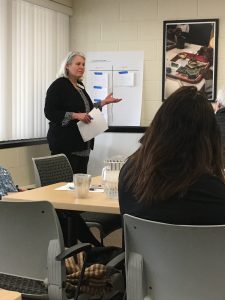
The Citizens League’s values have remained consistent for decades. Belief in the importance of civic leadership and active citizenship, in democracy and good governance continues to guide the League’s approach to influencing public policy.
But today, the Citizens League’s work is even more vital as we respond to current challenges.
“Policy has become a tool for dividing us as Minnesotans rather than improving our lives and communities,” said David Durenberger, former Citizens League board member and U.S. Senator. “The Citizens League has a distinguished record of identifying common problems and shaping solutions, by moving beyond partisanship and involving Minnesotans directly in the work of creating policy that works for all.”
Recently, we asked the Citizens League’s executive director, Kate Cimino, to talk about how the League is using our time-tested Study Committee model to meet the needs of our changing policy landscape.
“The basics of policymaking involve three steps – define the problem, develop a solution, and implement the solution. I look at our work as a continuum of projects and services that engage individuals in that process.”
The Study Committee remains an integral tool to bring everyday people into the first two steps of that process. At its most successful, the Study Committee recommendations make their way to a legislative branch for implementation. In 2018, our recommendations informed the City of Saint Paul’s Minimum Wage Ordinance.
In 2021, we are using the Study Committee framework to help Saint Paul evaluate their non-emergency 911 calls.
“However, the Study Committee can’t be our only tool to engage individuals in policymaking,” said Kate. “We need to create more access points to build a broad base of interest, awareness, and action. Programs like Capitol Pathways and our public event series develop an ecosystem of Minnesotans who see their role in the community and are inspired to act. Policy is everywhere – not just at the Capitol.”
The disparities in our state are indicators that the traditional approach to policymaking isn’t quite enough.
“We must have a body of work that focuses on understanding and redefining the problems, with a commitment that people who are most impacted by the issues are deeply engaged in the work,” said Kate. “Not only does this provide true perspective, but it builds capacity for community leadership.”
With this approach, we can bring attention and real solutions to persistent problems. For example, Citizens League’s projects on aging dig deep into specific issues – such as “solo seniors” and “sandwich caregiving” – that contribute to the lack of infrastructure to support our aging baby boomers. These problems have a big impact on our state but are often invisible.
Thank you for taking a stand to include more people in policymaking. Your civic leadership inspires others to make a difference in their community.
Sandwich Caregiving
A two-year study reveals how community engagement can reshape policy by redefining the problem
Many of us can relate to the challenges of caregivers who care for both young children and parents – the subject of our Sandwich Caregiving project.

Nurses and social workers discuss where they see gaps and assets in supporting caregivers, pre-COVID
Project partner Jess Roberts emphasized why redefining the problem was important. “No amount of investment will ever get you to the appropriate solutions if you’re not starting in the right place.” To address this, we engaged community with lived experience as collaborators.
Jess offered, “Creativity is not a lightbulb moment reserved for individual genius, it is the ability to bring together diverse perspectives and find unique connections. That’s where the unexpected will emerge.”
One key finding or “reframe” from the project countered the traditional narrative that caregivers just need more resources.
One of our collaborators, Humphrey School Doctoral Candidate Alejandra Diaz explained what that looked like for her mom, who cares for a parent with Alzheimer’s. “My mom is not necessarily highly educated, but she has a lot of capacity. She has a lot of know-how, as does my grandmother – she’s still a very capable human, who is aging.
Rather than focusing on providing specific products or resources, could we trust that people know how to take care of each other? And also build capacity around that authentic form of care?”
Instead of leading to more government spending on resources, this “reframe” prompts us to ask, how can we work with employers to develop and prototype policies that help address this vexing problem?
Your support is essential to develop innovative policy studies that help Minnesota address the unique policy challenges of our time.